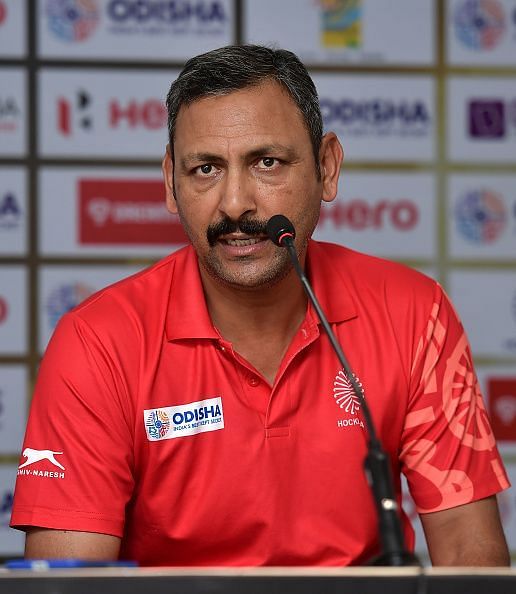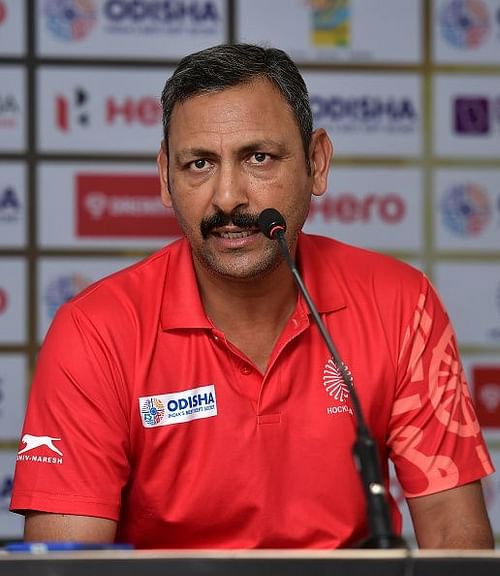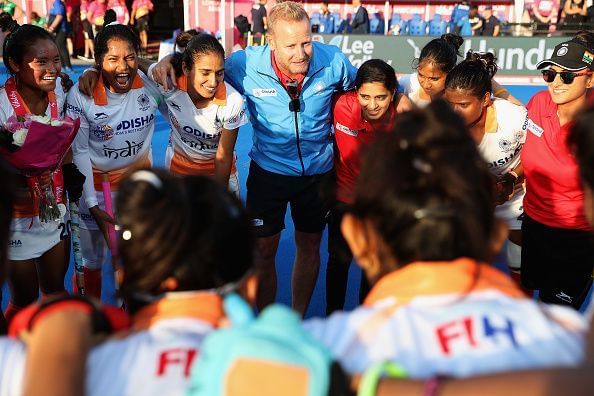
Positives outweigh negatives as the year of reckoning ends for Sjoerd Marijne and Harendra Singh

On the eve of the Commonwealth Games, as the Indian men's team were undergoing a rigorous workout under the watchful eye of Sjoerd Marijne, and Chris Ciriello, who had just taken charge as Analytical Coach, the Dutchman's booming voice resonated loud and clear amidst the serene surroundings of the SAI complex at Bangalore.
On the shimmering sky-blue turf, Marijne had the Indian men's team in a huddle near the periphery of the goalmouth.
"You may lose the ball in the circle - and that's okay if you lose the ball sometimes, but how soon you get it back is what is important," said the coach as his wards absorbed every word with rapt attention.
"It's the end of the year which will determine whether we succeed or not," said the Dutchman to Sportskeeda in an obvious reference to the Men's World Cup at Bhubaneswar.
A quirk of fate - and a role reversal for Harendra and Marijne
Barely a stone's throw away, on the pink pitch, Harendra Singh was preparing the Indian girls for the Commonwealth Games - and after a gritty campaign where the girls beat England but lost out on a podium finish, the veteran coach told Sportskeeda that he was proud of the girls but wanted to iron out a few flaws ahead of the London World Cup.
"Time to sit in the drawing room and chalk out a comprehensive training program to rectify the small mistakes for which we paid the price," said Harendra.
Little did Sjoerd Marijne know that his moment of reckoning would be at London and not Bhubaneswar - just as Harendra Singh led the Indian men and not the women to the drawing room, by virtue of a quirk of fate that neither gentlemen could have foreseen.
After a Mayday coach swap that hit the national headlines and took the sporting world by storm, how has the year eventually panned out for Sjoerd Marijne and Harendra Singh?
From the women to the men - and back to the role he truly cherished
Marijne who had been following the fortunes of the Indian women's team for a while felt the girls possessed ample skill that could be bolstered with speed, strength, fitness, and an introduction to the techniques of modern hockey.
The former coach of Den Bosch Club who also had a stint with the Dutch women's team took on the job of coaching the Indian girls along with assistant and fellow-Dutchman Eric Wonink, in February last year - but in less than seven months' time, he was entrusted with a job involving infinitely more pressure which he had neither asked for nor expected.
"I was positively surprised," said Marijne when asked if he had ever expected to coach the Indian men's side following the departure of Roelant Oltmans.
Soon after his appointment, the Indian men travelled to Dhaka where they won gold in the Asia Cup, followed by a bronze at the Hockey World League Final in Bhubaneswar - but it was at the beginning of 2018 that Marijne brought about some exciting new changes in Indian hockey.

A Four-Nations Invitational in New Zealand was slated to be the first tournament of the year, and goalkeeper PR Sreejesh was picked after an eight-month layoff due to injury, but three new faces - Dilpreet Singh, Simranjeet Singh, and Vivek Sagar Prasad made their way into the senior squad and made their presence felt right away.
An even bigger surprise was to follow, as Marijne opted to travel to Ipoh with a team packed with fledgelings, which comprised of only three seniors - Sardar Singh, Ramandeep Singh, and SK Uthappa, who took on the might of full-strength Australian, Argentinian, and English squads at the Azlan Shah Cup.
At the Commonwealth Games in Gold Coast, the Indians lost to New Zealand in the semifinals and failed to match their silver-medal winning performances of Delhi 2010 and Glasgow 2014.
Veteran Indian striker SV Sunil summed up India's performance at Gold Coast in an interview to Sportskeeda before the Champions Trophy.
"I think we played quite well in the CWG. The only match which did not go well was the semifinal match against New Zealand. I feel we took the Black Sticks lightly as we had beaten them easily in the Four-Nations Tournament (in January). I felt that we were a bit complacent against them."
A momentous change was soon to follow as Sjoerd Marijne was asked to return to his duties with the girl's side while Harendra Singh - whose team narrowly missed out on a podium finish after a gallant performance at Gold Coast, was given charge of the Indian men's team.
Harendra could hardly be described as a newcomer, after having served as an assistant coach in the past as well, but this time the challenge was enormous.
Race against time? No, said Harendra
Following his appointment as the men's coach on May 1, Harendra had less than two months to prepare the team for the final edition of the Champions Trophy, which was soon to be followed by the Asian Games - with a potential ticket to Tokyo 2020 at stake, and the biggest tournament of all - the World Cup at the end of the year.
A few weeks after the appointment, Sportskeeda had asked Harendra Singh if he felt he had the time to implement the changes he needed to - and the retort was just as instant as it was emphatic.
"I have worked with 41 out of the 48 players in the camp at some point or the other and I am totally familiar with the setup in Bangalore. I do not need time as I am familiar with the language and culture."
India's campaign for the Champions Trophy seemed jinxed even before it had begun with Akashdeep Singh and Sumit Kumar suffering last-minute injuries, and Ramandeep Singh being unable to continue following the opener against Pakistan.
Yet, an emphatic win over Pakistan, followed by a win over Olympic champions Argentina the very next day sent Indian hockey fans into a tizzy - but more was to come as the Indians very nearly upset Australia in the gold-medal match after holding Belgium and Holland to creditable draws along the way.
It was one of the best performances by an Indian men's team in recent times, but in an interview to Sportskeeda after the tournament, Harendra Singh said he was bitterly disappointed at having lost out on the gold medal, and that the team would be on the podium at Bhubaneswar on December 16.
"We were in the Champions Trophy to win and not to merely participate," said Harendra. "There is no doubt that we will finish atop the podium in the World Cup on December 16."
From the glory of Breda - to two bad days at the office
After the stunning show at Breda, a gold in the Asian Games seemed to be a foregone conclusion, and the Indians toyed with their opponents pumping in 76 goals in 5 pool matches but quite shockingly hit a roadblock against Malaysia in the semifinals.
Harendra was distraught as he analyzed the loss and opined that the Indians needed to pass better based on the match situation.
"We need to work more on improving our peripheral vision and scanning on the pitch which will enable a player to make the judgment as to who he should pass the ball to in a particular situation."
Sure enough, Akashdeep Singh - the player with admirable peripheral vision was asked to don the role of linkman during the Asian Champions Trophy which preceded the World Cup - but SV Sunil, India's livewire up front picked up an injury which no doubt upset the plans of the Indian think-tank.
At Bhubaneswar, the Indians impressed, in patches, and seemed to come out and play inspired hockey following the breaks - possibly, after a hard talk session with Harendra.
Manpreet and co. very nearly got the better of eventual gold-medalists Belgium, but failed to keep their heads in the last fifteen minutes of the all-important quarterfinal against the Netherlands.
Was Harendra's outburst against the referees justified?
Months of unending toil, planning, strategizing, and meticulous preparation came to nought, causing the passionate Indian coach to question the umpiring in the quarterfinal - which brings us to the question - was Harendra's outburst justified?
Former goalkeeper Mir Ranjan Negi who was unfairly denigrated following India's 1-7 loss to Pakistan in the final of the Delhi Asian Games told Sportskeeda that Harendra, perhaps, had a point since the Indians had come tantalizingly close to a place in the semifinals.
"It is sad but true that India is never favoured as far as umpiring is concerned - although it is a known fact that India is the only country which can pump in money and popularity to hockey."
"Hockey is a fast game where one advantage rule given to a team can turn the tide of the match. Our team was very good this time and we missed a great chance to stand at the podium. Maybe, Harendra blasted out in frustration."
The frustration at losing close matches is quite understandable - ask Sjoerd Marijne whose chargers made it to the quarterfinal of the Women's World Cup against Ireland.
With just over ten minutes to go for the end of regulation time, the Indians earned a PC. If Sjoerd Marijne's plan had been executed to perfection, the Golden Girls could well have made it to the semifinals.
Contrary to the plan, however, the injection was too far too much to the middle, instead of being to the right - where Rani Rampal was waiting to latch on and execute her trademark shot.
The Indians were defending grittily, and a goal at that juncture of the match would most likely have sounded the death knell for Ireland - but following a goalless sixty minutes, the Irish prevailed in the shootout that followed, breaking the hearts of a million Indian fans.
"In these moments, you always have to be good - that makes all the difference," lamented the Dutchman after the tournament.
Indian men and women have moved up - not down in 2018
Yet, a silver medal in the Asian Champions Trophy at Donghae, and another silver at the Asian Games, following a gritty show at the World Cup (where Rani and co. very nearly beat hosts and Olympic Champions England), have ensured that the Indians are the highest-ranked Asian team in the world, perched currently in the ninth position.
Thanks to Scientific Advisor, Wayne Lombard, the Indian girls and now fitter and stronger than ever before, which has clearly helped them close the gap with the top teams in the world.
The Indian men, for their part, are also the highest-ranked Asian team (by quite a huge margin) and have displayed by their performance against sides like Australia, Belgium, and the Netherlands this year, that they are well on their way to climbing the rungs of world hockey.
Much like the women, the men too have moved up the ladder as compared to their rankings at the beginning of the year, and both coaches deserve credit for the same without a shadow of a doubt - and an extended tenure to carry forward the ascendancy.
Shane McLeod's Belgians ended up fifth at the Champions Trophy at Breda, just about avoiding the wooden spoon - just as Max Caldas' Dutch side did at Bhubaneswar, finishing seventh at the Hockey World League Finals last year.
Yet, both Shane McLeod and Caldas were allowed to continue, and guided their teams to the final of the World Cup - is patience the key for Indian hockey to develop?